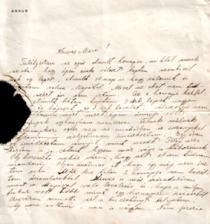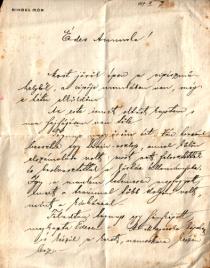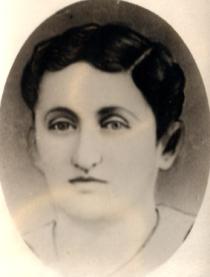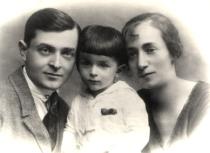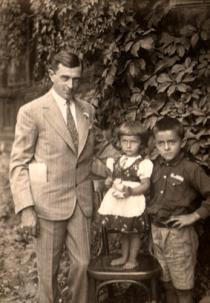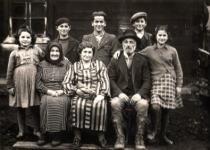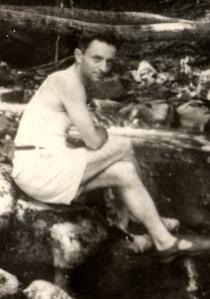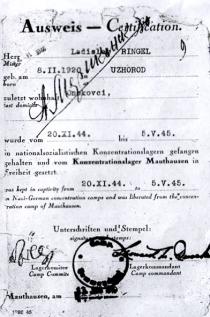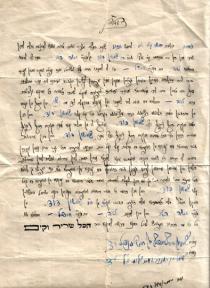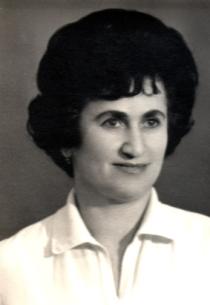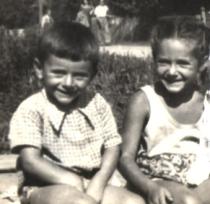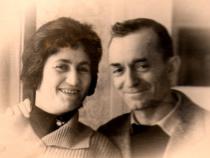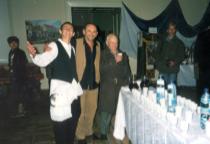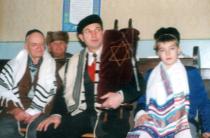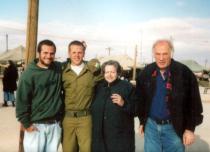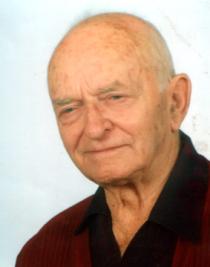Me during my service in the work battalion. We were based on an island near Budapest. This photo was taken in 1940 by my fellow comrade, and I sent it home, to my parents. After the war I found it in our house.
In 1938 I finished my grammar school we passed our graduate exams and obtained secondary school certificates. In 1938 anti-Jewish laws began to be introduced in Subcarpathia. After finishing school I couldn’t continue my studies. Jews were not admitted to higher educational institutions. I went to Budapest where I became an apprentice in the joiner shop. From there I was recruited to the army in 1938. The military commission sent me to a field engineering battalion where I served half a year. We were trained to build pontoon bridges, studied blasting, search and removal of mines on an island on the Danube near Budapest. After the law on work battalions was issued all Jews from 4 field engineering battalions were gathered in one battalion that they called a forced labor battalion. A Hungarian officer became its commander. We wore soldiers’ uniforms, but had yellow armbands on our sleeves. In 1942 we were moved to Ukraine to dig trenches near the front line and removed mines. We kept moving from one place to another. Many people perished there and there were many who lost their arms or legs. Every day before going to bed I begged God to allow me an easy death rather than make me a cripple. In 1943 Soviet troops began an attack and we were taken to Romania to build fortifications on the border and shelters in the mountains. [He probably refers to Northern Transylvania, that is a part of Romania now but was a part of Hungary during those times.] Later we moved to work on a railroad construction. We installed 40 km of the rail track in Northern Transylvania. From there we moved back to Subcarpathia, to the village of Volovets [70 km from Uzhgorod, 600 km from Kiev], in the Carpathian Mountains where we built bunkers and fortifications in the mountains. In spring 1944 commanding officer of our battalion received a telegram from his commanders that our battalion was to be transferred to Hungary, Szerencs town. We went there by train.
At that time they began to send Jews to ghettos. They also captured those who tried to hide away. Our battalion was sent to sort out things in the Jewish houses whose owners were taken to the ghetto. From Szentes we were sent over the [former] Yugoslav-Hungarian border, to the Hungarian occupied a part of Yugoslavia. We built fortifications on the right bank of the Tisa river, and lived in the Ada on the bank of the Tisa. It was October 1944. There was firing heard in the town and locals said that those were partisans shooting in the town. All of a sudden one day Hungarian and German troops began their retreat. We crossed the river and walked on to the Austrian-Hungarian border, over 300 km. Soviet troops were in Uzhgorod already. They were advancing. We were sent to dig trenches, obstacles and tank ditches. We were moving away from the border and worked on the territory of Austria. In winter 1945 Soviet planes started firing at our positions and we evacuated from there urgently. Then we boarded a train to Mauthausen. We didn't know we were going to the concentration camp. We thought we were moving to another work site. In April 1945 military troops were approaching Mauthausen and we evacuated to Gunskirchen town in about 20 km from Mauthausen. There were also barracks there and prisoners from surrounding camps were taken to this area. Germans were raging and we understood that the war was coming to an end.
On 5 May 1945 we woke up from the roar of shooting in the morning. I stepped out of the barrack. All of a sudden the gate of the camp open and camouflage color trucks drove in. I could’t see from afar whose troops these were, but then I saw Negroes in the trucks. American soldiers. All inmates ran out of their barracks hugging and kissing the Americans. It’s horrible to think of how we smelled - we hadn’t washed for a long time before… The Americans gave us meat cans and bread. We were free! We were issued certificates of prisoners of a concentration camp indicating that the US army liberated us.

